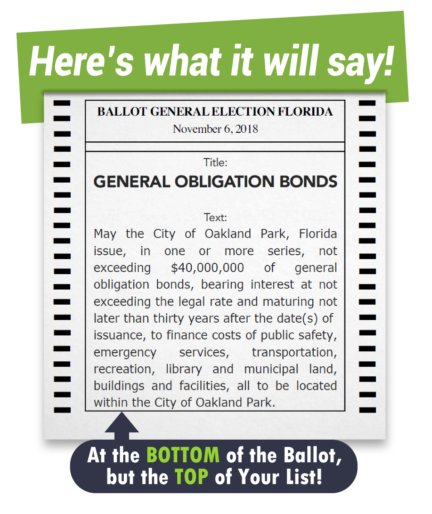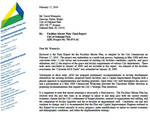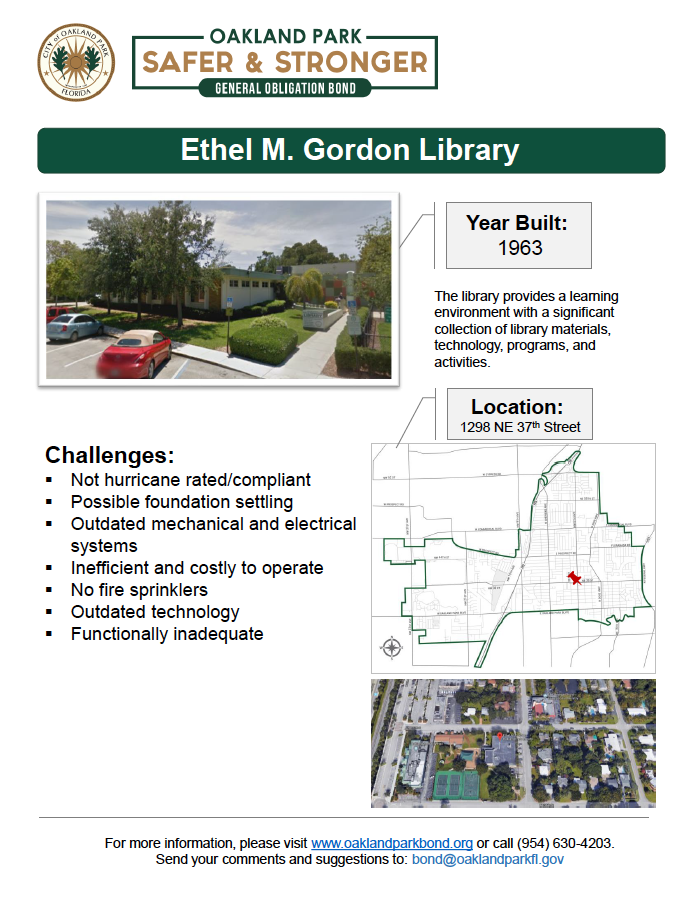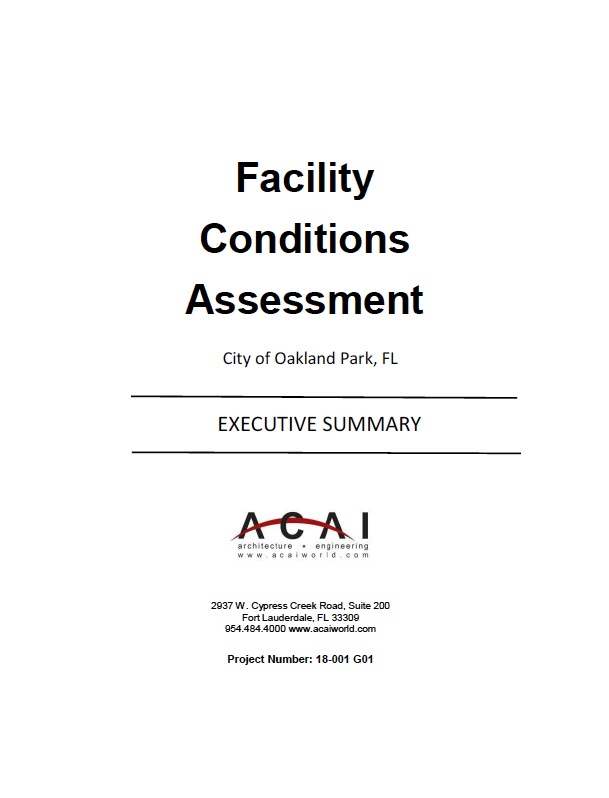On NOVEMBER 6, voters approved a bond measure that will deliver major improvements to the City of Oakland Park.
The Oakland Park Safer & Stronger Bond is a general obligation bond for the City of Oakland Park to fund improvements for critical public facilities.

3 Things to Know
FREQUENTLY ASKED QUESTIONS
What is the Oakland Park Safer & Stronger General Obligation Bond?
The Oakland Park Safer & Stronger Bond is a proposed $40 million general obligation bond for the City of Oakland Park intended to raise funds to make improvements to critical public facilities. These improvements include the modernization of the City’s three fire stations and multiple community centers that provide services to Oakland Park’s diverse population, including children, seniors, and adults. Registered voters will vote on the bond as part of the November 6, 2018 general election ballot.
Why is this bond being proposed?
Many of the City’s critical facilities including fire stations, recreation facilities, and the municipal library are aging as the majority of these facilities were constructed between 30 and 50 years ago. A Facilities Master Plan was completed and adopted by Commission in 2010. This plan highlights that the majority of the City’s structures are non-compliant with Florida Building codes; are not compliant with Americans with Disabilities Act standards; do not accommodate critically important functions and lack hardening standards that pose safety risks to the City and our first responders during hurricanes, which create potential operational risks during disaster recovery.
Why weren’t facility issues addressed earlier?
The 2010 Facilities Master Plan identified many critical deficiencies for existing City facilities. A general obligation bond was recommended at that time, however the downturn of the economy created significant financial difficulties for the City and residents which delayed the ability to address facility issues.
What projects would be funded through this bond?
The bond would focus on the creation of a $40 million program for replacing and/or renovating the City’s vulnerable and outdated facilities that serve the public. Based on the 2010, 2017, and 2018 Facility Assessments, the following facilities are recommended for consideration:
– Fire Rescue Station 9
– Fire Rescue Station 20
– Fire Rescue Station 87
– Park Place at Jaco
– Collins Community Center
– Ethel M. Gordon Oakland Park Library
– North Andrew Gardens Community CenterIf the general obligation bond is approved by voters, final selection of projects would be approved by the City Commission as part of the development of a formal implementation plan.
What is a general obligation bond?
A general obligation bond is a voter-approved municipal bond backed by the credit and taxing power of a government. These low-interest bonds are repayable from taxes and would appear as “voter approved debt service” on the tax bill. Every dollar will be spent right here in Oakland Park to benefit the people who live here. Both current and future residents would share in the benefits and costs of improvements.
General obligation bonds are a common tool used by cities to raise money for local improvements. Over 50% of the cities in Broward County have such bonds for this purpose. The neighboring cities of Wilton Manors, Fort Lauderdale, Lauderdale Lakes, and Pompano Beach all have approved general obligation bonds for municipal projects.
What is a general bond referendum and when is it going to be held?
A referendum is a set city-wide election date on which voters may consider the proposition or approval of the bonds. The Florida Constitution requires a general obligation bond to be approved by a majority of voters within the boundaries of the issuing entity (the City).
The City Commission approved a bond referendum on May 2, 2018, setting the date of referendum to be November 6, 2018.
Is this the first time Oakland Park has issued a bond like this?
No. The City of Oakland Park last issued general obligation bonds in 1972 for sewer improvements. If approved, the Oakland Park Safer & Stronger Bond would be the first general obligation bond for the City in almost half a century.
How would a bond affect my taxes?
It is estimated that the monthly cost to the median, homesteaded, single-family home would be approximately $10 a month. The bond’s annual cost to individual homeowners would be based on the taxable value of the property, not the sale/market value. Taxable value is, in general, considerably below a home’s sale value, as the taxable value is limited through homestead exemptions and the Save-Our-Homes amendment.
When would the bonds first appear on my tax bill? How long would they be on there?
If the referendum is approved, the general obligation millage rate would first appear in November 2019. This would continue to appear on the bill until the maturity of the bonds, which is generally 30 years.
Which projects will get done first and how will the City decide?
Projects will be prioritized based on numerous considerations, such as each project’s current status (under design, included in grants, etc.), immediate needs of the community and impact to the community from a construction standpoint. Projects will be staggered to ensure City continuity in operations and service delivery.
How long will it take to complete projects?
It is currently estimated that it will take the City seven to ten years to complete all projects.
How will residents be kept apprised with the status of projects?
As with all capital projects, the status of projects will be reported on the City’s website as part of the Commission Agendas.
What happens if a project comes in under budget?
Once a project is completed, any surplus of bond proceeds will remain on deposit and may be applied to another approved bond project.
How would our Fire-Rescue services be improved?
Proceeds from the bond would be used to replace the City’s two oldest fire stations: Fire Station 9 on Park Lane East (NE 38th Street) and Fire Station 20 on Powerline Road. Both of these stations were built in the 1960s and have extensive structural deficiencies and are not up to current Florida Building and Life Safety codes. In addition, these facilities were not designed to meet the operational needs of a modern Fire-Rescue Department, such as the storage of medical and extraction/rescue equipment, bays large enough to accommodate new fire trucks, and male and female living quarters.
Proceeds would also be used to renovate Fire Station 87 on NW 21st Avenue. Station 87 was built in 1982; initial studies indicate that only renovations to this station are needed to modernize and bring the facility to current code.
Why doesn’t the City just fund projects on a pay-as-you-go basis, instead of proposing the issuance of G.O. Bonds?
Pay-as-you-go means that the City puts a little money aside each year into a capital improvements fund, similar to putting money in a piggy bank, which accumulates until there is enough money available to eventually complete City improvement projects. The City funds many projects through a combination of grants and pay-as-you-go funding. Addressing the critical facility issues of the City would require the accumulation of sufficient funds that could take decades, further delaying critical facilities projects and potentially costing millions to maintain existing aging buildings.
Low interest general obligation bonds would allow the City to move quickly to address these critical needs. The cost of external financing would run concurrent with the lifespan of the facilities, meaning that those who contribute to paying for these improvements actually receive the benefit and allows future residents to also pay their fair share for these projects. Pay-as-you-go means only current residents would pay for City improvements. With the general obligation bonds both current and future residents share the cost and benefits of those improvements.
Will bond proceeds be used on the City Hall building or the Oakland Park Square project?
No. The proposed bond program will not fund the replacement, relocation, or renovation of City Hall, nor does the bond relate in any way to a proposed public-private partnership on the two City-owned West Dixie Lots (Oakland Park Square).
If I rent, will this impact me?
There will only be a direct impact to residents and businesses that own property within the City.
What community outreach was done prior to general obligation bond being placed on the ballot?
On February 21, 2018, staff presented the state of the City’s facilities to the Commission and provided an overview of these prior studies and recommendations. Staff presented a plan for community outreach to provide residents an opportunity to engage and give feedback and ideas. This outreach included an Open House Informational Session at Collins Community Center on March 14 and tours of City facilities over the weekends of March 17 & 18 and 24 & 25. These events were noticed to the public through a special citywide mailing to residents, the City’s website, e-mail/NotifyMe communications, and featured in the Oakleaf. In addition, staff made presentations to Home Owners Associations and civic groups. An update on the facilities initiative was presented to Commission on April 18 and the general obligation bond ballot referendum was presented and approved by Commission on May 2.












